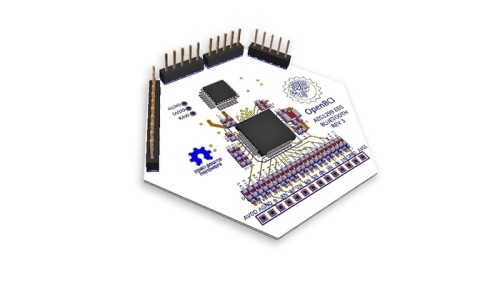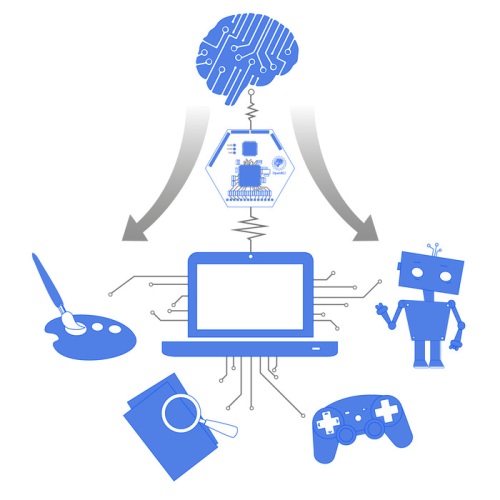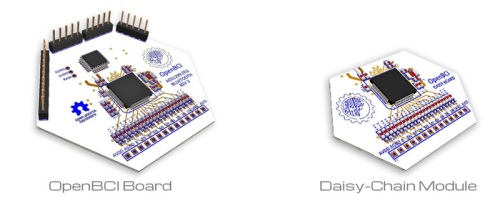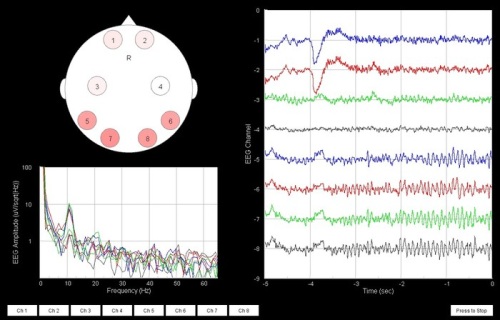In an attempt to accelerate innovation in the area of brain science, Joel Murphy and Conor Russomanno have proposed a solution on crowd-funding site Kickstarer: OpenBCI, a versatile, affordable, Arduino-compatible, 8-channel, 24-bit analog-to-digital converter and electroencephalography (EEG) platform that gives anyone with a computer access to high-quality, raw EEG data.

The key to the technology is the fact that it is open source, a feature that will hopefully advance the field of brain science through collaborative hardware and software development.

All things considered, brain-computer interfacing (BCI) is a relatively new field of science, but what’s so exciting about it is that it offers a tremendous amount of possibilities in terms of treating mental ailments.
For instance, medical-grade BCIs are being used in a variety of neurotherapy applications, to assist those with ADHD, anxiety, phobia, depression, and other common psychological ailments. Neurofeedback and biofeedback technologies are also being used by artists, musicians, dancers, and others involved in creative fields, in order to find new ways of connecting people with the world around them.
There are a lot of – and this is coming from their Kickstarter page – “bells and whistles” to the OpenBCI technology; specifically, its ability to generate internal signals for testing and collaboration at all levels, from the hobbyist to the medical / technical professional, and EEG-specific functions like lead-off detection, which ensures electrodes are making good contact with the subject.

In terms of specs, OpenBCI is built around Texas Instrument’s ADS1299 IC. It includes a programmable Bias signal and flexible input multiplexer. The board uses an on-board ATmega328 flashed with Arduino’s latest bootloader, and the team broke out all of the Arduino pins so users can blink lights or move motors like with Arduino, except in this case, it’s being used with brainwaves.
Rather than re-run all the full list of specs in this article, you can download the technology’s datasheet at ti.com
There are two versions of the board available — one is the OpenBCI Board, described above, and the other is the Daisy-Chain module, which users can purchase in order to add another 8 channels (sensors) to the system.

As for the sensors, OpenBCI supports both passive and active versions. And in terms of data, everything is accessible to all commonly used open-source EEG signal processing applications, including BrainBay, OpenVibe, and more.

The idea upon which OpenBCI is based is exciting, mostly because research-level EEG equipment is not only ungainly, but incredibly expensive too.
What’s more, top-of-the-line commercial brain-computer interface companies distribute fixed devices that have limited or closed access to the algorithms that translate EEG signals into useful data.
Translation: current EEG technology is too limited for a field that needs to grow faster.
OpenBCI is not only applicable with consumer-level technology, the programming behind it is transparent, and influenced by an open-source community of hardware and software builders, electrical engineers, doctors, researchers, and others, all of whom are bringing their talent to it to modify the technology and, in turn, better understand the science.
The goal of putting the technology on Kickstarter is to be able to add wireless Bluetooth connectivity to the OpenBCI board. This will enhance its safety and make it more portable and wearable.
The group also wants to integrate the Arduino-compatible uC onto the board, as well as add an SD card slot for local data storage capability.
With a little more than a month still to go on their Kickstarter campaign, OpenBCI has already eclipsed the halfway mark to their $100,000 goal.
To show your support, or to learn more, head to Kickstarter.com
Advertisement
Learn more about Electronic Products Magazine





